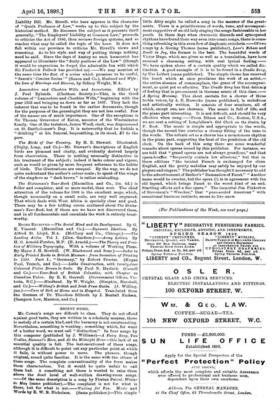RECENT MUSIC.
Mr. Cowen's songs are difficult to class. They do not offend against good taste, they are written in a scholarly manner, there is melody of a certain kind, and the harmony is not uninteresting. Nevertheless, something is wanting ; something which, for want of a better word, we must call " distinction." In four songs by this composer (published by J. Williams)—A Fairy Song, Two Castles, Summer's Here, and At the Midnight Hour—this lack of an essential quality is felt. The last-mentioned of these songs, although it is difficult to point out any particular point at which it fails, is without power to move. The phrases, though original, sound quite familiar. It is the same with the others of these songs. The complete conventionality of the form makes them characterless. Yet it would be quite unfair to call them bad. A something not there is wanted to raise them above the dead level of well-written drawing-room songs. —Of the same description is a song by Florian Pascal, Winter 'en May (same publisher).—The complaint is not for what is there, but for what is not.—Waiting for You. Music and Words by E. W. B. Nicholson. (Same publisher.)—This simple little ditty might be called a song in the manner of the great- aunts. There is a primitiveness of words, tune, and accompani- ment suggestive of an old lady singing the songs fashionable in her youth. In these days when chromatic discords and syncopated rhythms have found their way even into comic songs, there is some- thing refreshing in this even flow of diaphonic crotchets.—Of two songs by A. Goring Thomas (same publisher), Love's Echoes and Dwell in Joy, the former is the best. The beautiful words of Victor Hugo, which are given as well as a translation, have here received a charming setting, with real lyrical feeling.
We have spoken above of a certain quality which we called dis- tinction. A good example of it is to be found in a Cradle Song, by Uso Leifert (same publisher). The simple theme has received the touch which at once proclaims the work of an artist,— the entire absence of commonplace, the grace of the accompani- ment, so quiet yet so effective. The Cradle Song has that delicacy of feeling that is pre-eminent in German music of this class.— A Spring Morning. This short cantata for a chorus of three treble voices, by A. E. Horrocks (same publisher), is melodious and artistically written. It consists of four numbers, all of which, except one, are choruses. The music is full of life, and the piano part interesting. It is not difficult, and should be very effective when sung.—From Ditson and Co., Boston, U.S.A., we are sent a setting of Longfellow's Old Clock on the Stairs, by F. Boot. The music is simple and appropriate to the words, though the second line contains a clumsy fitting of the tune to the words. The refrain set as a chorus has a monotonous rhythm in the piano part, suggesting the beat of the pendulum of the old clock. On the back of this song there are some wonderful remarks about operas issued by this publisher. For instance, we are told that " grand operas are not always grandiose," and that opera-bouffes "frequently contain low allusions," but that in these editions " the tainted French is exchanged for clean English, and the pretty melodies may safely be enjoyed by our players and singers." The publisher has thought it necessary to add to the advertisement of Berlioz's " Damnation of Faust." " Another name would be sweeter, but the opera (!) is in agreement with the old legend, which brings Faust to the worst kind of an end. Startling effects and a fine opera." The immortal Jim Pinkerton of Stevenson's " 'Wrecker," that " pure-souled American " with sensational business instincts, seems to live anew.
(For Publications of the Week, see next page)


































 Previous page
Previous page